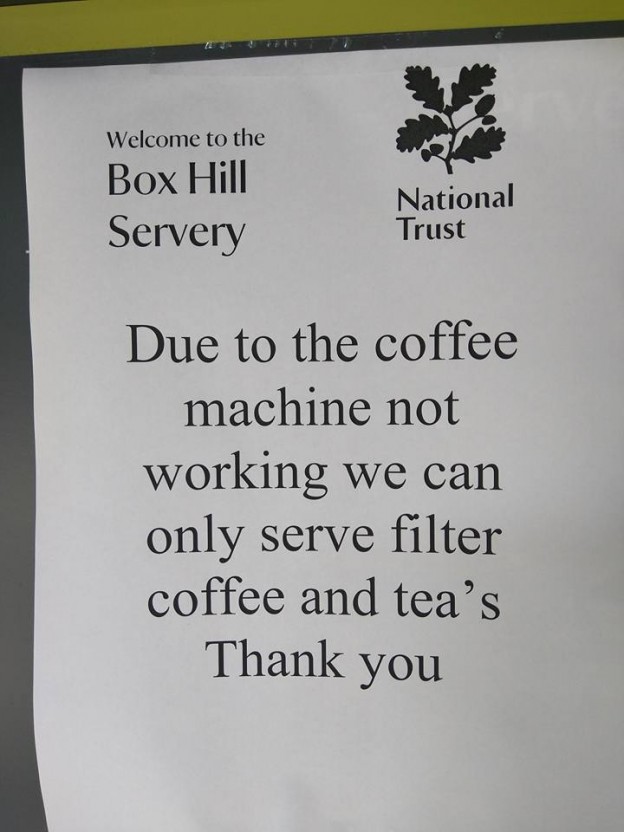Donald Trump has declared that he has no time for “political correctness”. Well a lot of us don’t have time for you, Mr. Trump, and not just because we like to mind our verbal Ps and Qs. We at Glossophilia are all for being PC — when it’s necessary. As the NBA’s leading scorer Kareem Abdul-Jabbar recently commented in the Washington Post: Continue reading
Category Archives: Words, phrases & expressions

Due to time and usage, “due to” and “because of” enjoy adverbial synonymy
“Due to inability to market their grain, prairie farmers have been faced for some time with a serious shortage of sums to meet their immediate needs.”
That’s not the Queen’s English!, the purists and prescriptivists are beginning to protest (and I have to admit, my ears are slightly cringing in sympathy). Isn’t “due to”, strictly speaking, an adjectival phrase, meant to describe nouns and not verbs? If you can’t replace it successfully with “caused by” or “attributable to”, shouldn’t you be sent to the grammatical corner to gather your thoughts and rephrase your words? Continue reading
Words in the news that do (or don’t) travel well
A few words have enjoyed cameos in the news recently, thanks to their skills — or lack thereof — in crossing borders. Donald Trump should take note. But beware: the Swede is a little saucy … Continue reading
Homing in on home
“I’m coming home
I’m coming home
tell the world I’m coming home”
So the song goes, and it’s a familiar refrain. We all know the definition of that abstract four-letter word, whose actual meaning is unique to everyone who uses it. But here’s a funny question: when we talk about “coming home”, “going home”, “getting home” or “being home,” what role in the sentence does the generic place-name play: is it a noun, as most places tend to be, or, strangely, could it be an adverb? Continue reading
From soup men to grammar nuts: is the name Nazi OK?
In a bizarre story coming out of Russia a couple of months ago (and no, it wasn’t in April), government officials in their zealous drive to purge the country of any symbols or supporters of fascism and Nazism went after a language pedant, probing his links with “grammar Nazis”. According to the Moscow Times, “prosecutors in southern Russia … summoned for questioning Alexei Pavlovsky, the head of Bonus Media, which supports the local branch of the popular Total Dictation educational project. The project tests how accurately people can transcribe a text read orally. “They asked me first about the dictation, about my other civil initiatives, and then politely inquired about what I knew about grammar Nazis, and whether they were financing my activities,” Pavlovsky wrote on his Facebook page.”
It does make you wonder just how right or OK it is for the word Nazi — a name with such abhorrent associations — to be appropriated for more benign or jokey purposes. Continue reading
Tan or tanned, brown or bronzed?
It’s tanning season again, and time for a talk about tan.
“’You’re so tan. Are you out of L.A.?’” asked the former Alaskan governor, Sarah Palin, of a New York Daily News reporter recently. “Palin then confessed that her golden glow came from a salon. ‘Mine’s fake,’ she quietly confided. ‘I mean, I’m Alaskan.'” Continue reading
You say string bean, I say haricot vert …
Most of us know and agree on what “green beans” mean — i.e. what they look and generally taste like. (We also know that beans meanz Heinz — and that’s another story altogether.) But those grass-colored finger-shaped legumes have a lot of names — and not just because of the almost infinite varieties of bean, but also thanks to the inability of the Brits and Yanks to agree on what they should call them (even among their fellow citizens). Continue reading
Mad props
Warning: mildly explicit content
“Ayo I got the mad skills that make you wanna flex
I dominate this track so it’s time to have sex
But just chill while I get all in it
Cause I’m about to rip it, who said I couldn’t kick it
Uh, I get shots off just like a shotgun
Stick a fork in your butt, you’re just about done
I pour you MCs just like a lobster
Cause this hip-hopper gets props just like a mobster”
So rapped Da Youngstas in his song “Who’s the Mic Wrecka” — and I guess he should get props for rhyming “just like a lobster” with “just like a mobster”. Mad props, in fact.
According to Oxford Dictionaries, props means “respect or credit due to a person”. But where does it come from? Is it related to theatrical props? Continue reading
Fruity slang
There’s a lot of fruit in our lingo — some of it friendly, some of it offensive, and some just downright vulgar. Here are some of the ways our tongues get fruity in daily conversation.*
a new logo (spot the difference)
Facebook got a new logo on Wednesday. The old one on the left in the image above has been replaced by the one on the right. Can you spot the difference? Clue: I’m posting this on Glossophilia …
Check back here tomorrow for the answer if you can’t see it. (And no spoilers in the comments section please!)
~~~~~~~~~~
Update: the biggest difference is that the new logo has a single-deck “a”. Other more subtle changes are the rounder “o”s and “e”, a slightly longer and more traditional stem to the “b”, and different kerning.









